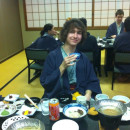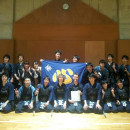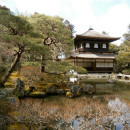Pack light, travel everywhere. Past Review
By Kramer L (Japanese and Computer Science, Austin College) - abroad from 09/01/2012 to 05/18/2013 with
IES Abroad: Nagoya Direct Enrollment - Nanzan University
The experiences I had through the IES field trips and my own personal travels in Japan were by far the best thing about my time in Japan. I got to see historical sites and the natural beauty of the country. Kyoto was the best. If you can go to Kyoto, go. Go right now. Also, my language skills at the end of the program were head and shoulders above what they were at the program's start. Living in Japan is most definitely the best way to improve your Japanese language skills. It was absolutely worthwhile, and I would return to Japan in a heartbeat.
Review Photos





Personal Information
| How much international exposure did you have prior to this program? | 1 month - 6 months |
Review Your Program
|
* Overall educational experience
Academic rigor, intensity, resources, etc. |
The Japanese language classes were quite difficult and had a great deal of homework, but they certainly succeeded in advancing my Japanese language skills. |
|
* Host Country Program Administration
On-site administration of your program |
The IES staff members in Nagoya, particularly Tsukamoto-sensei and Masae-san, were incredibly helpful, organized, and always available when a student needed them. I could text them with any questions regarding the program, field trip times, etc. and receive a prompt, friendly answer. |
|
* Housing:
How satisfied were you with your living arrangements? |
I did a homestay, and I think that was one of the best decisions I made in my program. There is nothing better for cultural immersion than a homestay, in my opinion. |
| * Food: |
I love Japanese food. My host family provided me with breakfast and dinner every day, and it was always delicious. |
|
* Social & Cultural Integration:
How integrated did you feel with the local culture? |
I fit in well with my host family, who was always friendly and welcoming, and I was able to make several Japanese friends through the university. Joining a club (the kendo club in my case) was also a great way to integrate with Japanese students. |
|
* Health Care:
How well were health issues addressed during the program? |
I broke my collar bone in kendo, so I came to have intimate knowledge of the Japanese healthcare system. My host mother took great care of me by setting up appointments, taking me to the clinic, and helping me through the different forms I had to fill out. However, if I had needed the help of the IES staff members, they would have gladly assisted me. I know that Masae-san, one of the IES program coordinators, personally took one of the students to the hospital when she came down with the flu. Japan has national health insurance, in which all the students were required to enroll, so paying for my healthcare was pretty simple. However, Japanese clinics and hospitals do not have an appointment system, so I was forced to wait quite a while on several occasions to see the doctor. Most of the doctors spoke a little English, but I would recommend taking someone who can help translate and fill out forms. I am pretty confident in my Japanese, but medical vocabulary is hard and trying to explain your ailment can be difficult. |
| * Safety: |
I felt that Japan, and Nagoya especially, was very safe. The only safety advice I would have is to be careful at crosswalks. Red lights in Japan have a pretty long grace period in which drivers will fly right through the intersection. |
| If you could do it all over again would you choose the same program? |
Yes
|
Finances
|
* Money: How easily were you able to live on a student's budget?
(1 = not very easy/$200+ on food & personal expenses/week, 2.5 = $100/week, 5 = very easily/minimal cost) |
The cost of living in Japan is quite high, but I think living with a host family helped. They provided me with breakfast and dinner each day, so I only had to pay for lunch, which was pretty cheap at the school cafeteria. IES will also reimburse you if you spend more than $60 per month on transportation. |
| Not including program expenses, about how much money did you spend on food and other expenses each week? | Less than $100 |
| Do you have any general money-saving tips for future study abroad participants? | Pack enough toiletries to last you through the program. Those can be pretty expensive, and for some reason, deodorant is really hard to find in Japan. |
Language
| * Did your program have a foreign language component? | Yes |
|
How much did the program encourage you to use the language?
0 = No encouragement, 5 = frequent encouragement to use the language |
The Japanese language classes were strictly Japanese-only, and I spoke in Japanese every day to my host family, Japanese friends, and kendo club members. |
| How would you rate your language skills at the beginning of the program? | Beginner |
| How would you rate your language skills at the end of the program? | Advanced |
| What was the highest level language course you had completed prior to departure? | Intermediate Japanese II |
| How many hours per day did you use the language? | |
| Do you have any tips/advice on the best ways to practice the language for future study abroad participants? | Do a homestay or join a club. |
Other Program Information
|
* Where did you live?
Select all that apply |
|
|
* Who did you live with?
Select all that apply |
|
|
* Who did you take classes with?
Select all that apply |
|
| About how many local friends did you make that you will likely keep in touch with? |
A Look Back
| * What did you like most about the program? |
|
| * What could be improved? |
|
| * What do you know now that you wish you knew before going on this program? | I wish that I had known the sheer amount of stuff that I would accrue during my time in Japan, and I wish I had packed lighter. Getting everything home at the end was kind of a nightmare. Also, this is really important, and I mentioned it in the "What could be improved?" section. In the spring, the semesters for the Japanese students and the study abroad students didn't sync up. For the majority of my spring semester at Nanzan, from February until mid-April, the Japanese students were on their spring break. This resulted in the college feeling incredibly lonely and empty, and it deprived the study abroad students of chances to make friends and practice speaking with the Japanese students. So for students going to Nanzan for only one semester, I would highly recommend going in the fall. |
Reasons For Studying Abroad
| To help future students find programs attended by like-minded individuals, please choose the profile that most closely represents you. |
The Nearly Native or Trail BlazerCraving the most authentic experience possible, perhaps you lived with a host family or really got in good with the locals. You may have felt confined by your program requirements and group excursions. Instead, you'd have preferred to plan your own trips, even skipping class to conduct your own 'field work.' |
Individual Course Reviews
| Course Name/Rating: |
Japanese Culture |
| Course Department: | Center for Japanese Studies |
| Instructor: | Nanako Machida |
| Instruction Language: | English |
| Comments: | The class focused on Japanese culture and how culture was reflected in the Japanese language. This class met once a week. Before each class, we were expected to have read a certain portion of the reading packets we had received, and it was graded on a large group project, a written report, and a final exam. Professor Machida is a fantastic teacher. She was always well-prepared for class and extremely knowledgeable of her subject. |
| Credit Transfer Issues: |








